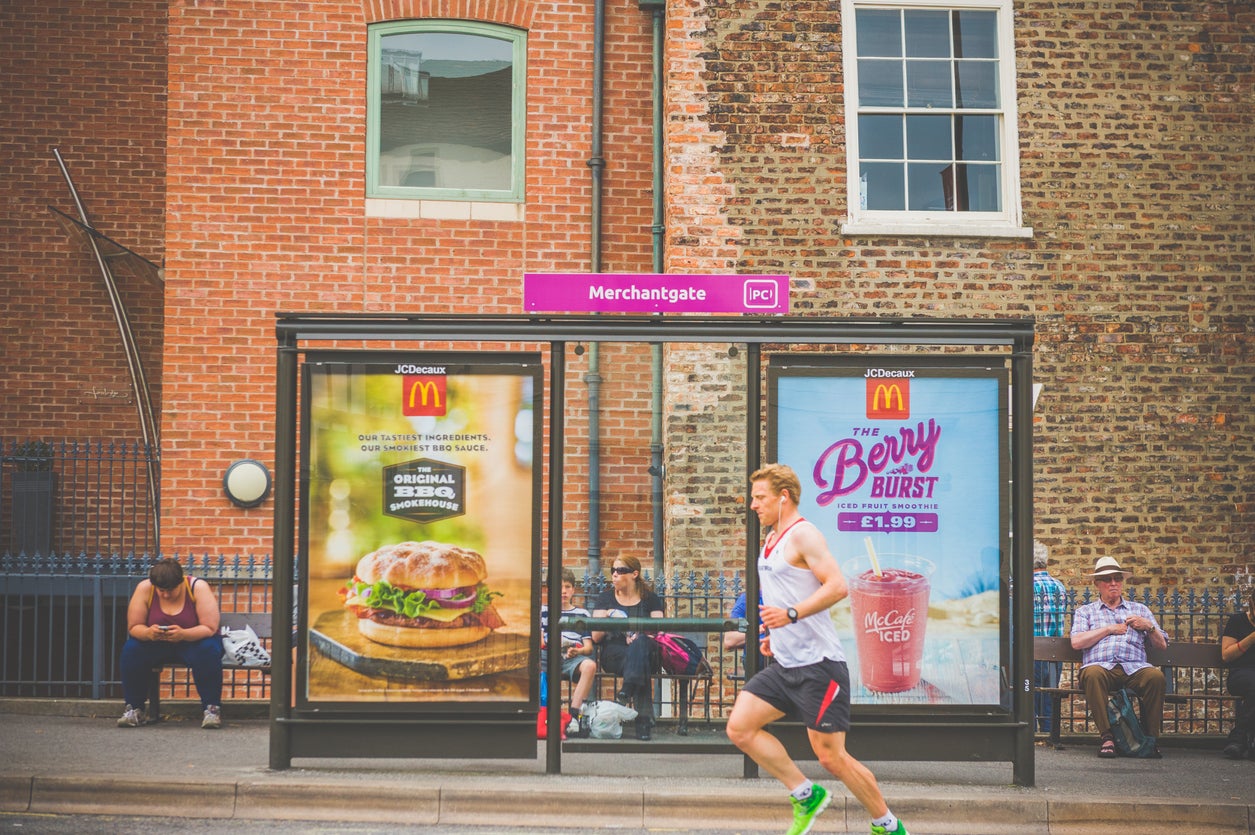The screen ban on junk food ads doesn’t go far enough for kids’ health | The Independent
On the internet alone, children are exposed to an estimated 15 billion junk food ads every year. More than a third of 10- and 11-year-olds leave primary school at future risk of food-related ill health. The government’s move to introduce long-awaited restrictions on the advertising of less healthy food and drink is a vital first step — but it overlooks one of the most persistent and visible forms of marketing: outdoor advertising.
From October, junk food adverts will be banned on TV before 9pm and online at any time. Yet Big Food has perfected the art of outdoor advertising — and young people are in the crosshairs. From bus stops to billboards, such ads follow them at every turn.
Recent research from Bite Back – the youth-led organisation against unhealthy food, of which I am chair – and the University of Liverpool analysed outdoor advertising across four UK local authorities with worrying results. Nearly half (44 per cent) of all adverts were for food and drink. Of the 333 adverts featuring a food or drink product, a majority (57 per cent) promoted at least one high-fat, salt or sugar (HFSS) product. McDonald’s accounted for 31 per cent of food ads, and a staggering 97 per cent of their advertising promoted HFSS products.
Most concerningly, this practice appears to primarily target underserved communities. Nearly half (44 per cent) of all HFSS adverts were found in the most deprived quintile, versus just 4 per cent in the most well-off areas.
The government’s ambition is to create the “healthiest generation of children”. But that cannot happen when Big Food has such a stronghold in so many young lives. Farid, 17, a fearless Bite Back activist from Manchester, knows it from first-hand experience. As he tells it, “since the day I was born, I’ve been targeted”. It is heartening to see young people speak out on this issue, but it is equally a shame that we have reached the point where they feel it is necessary.

We know outdoor advertising works, that’s why 25 food and drink companies spent more than £400m on it in the UK in 2024 alone. The disproportionate impact on the most deprived areas has major implications for social mobility. Those who already have to smash through the class ceiling must do so whilst unhealthy food and drink advertising looms over them, influencing their nutrition at the most important stages of development.
The ban is the correct first step to tackle Big Food’s influence on children via screens. But online is not the only way these companies can reach our young people. The physical environment remains just as important.
The government must go one step further. The ban should be extended to all outdoor ads for unhealthy food and drink, including billboards, bus stops and telephone boxes.
There are currently very limited restrictions on outdoor ads. A scoping review of policies in the UK found that outdoor food advertising was rarely restricted. When it is restricted outdoors, it is within 100m of primary and secondary schools. But this completely neglects that there are many other outdoor spaces where children will frequently visit, such as leisure centres, nurseries and playgrounds, passing billboards and bus stops.
Policies from the borough of Southwark in London highlight that local restrictions on junk food advertising work. But national action is needed to close the gaps. Following the mayor of London’s Transport for London (TfL) HFSS ad ban in 2019, Southwark introduced its own policy and now has the lowest rate of HFSS advertising among the cities studied, at 38 per cent of food adverts compared with 77 per cent in Newcastle.
TfL’s experience — showing no loss in advertising revenue since the restrictions were introduced — is proof that healthier advertising environments are possible without financial trade-offs.
Last year, North East mayor Kim McGuinness sent a strong message to Big Food: enough is enough when it comes to children’s health, announcing a ban on junk food adverts across public transport in the region. But Bite Back’s latest research shows that local authorities can go only so far. Without national action, private advertising spaces remain unregulated, leaving young people exposed to constant junk food advertising.
A recent freedom of information request from the BMJ found that advertising firms and lobby groups are warning councils that advertising revenues will plummet if they restrict such adverts, leading to some shelving their bans entirely.
Food companies need to take responsibility for the role they play in children’s health. They should use their amazing marketing and branding nous to help shine the spotlight on healthier food options, rather than racking up profit by hawking junk. That’s why we’re also calling for requirements on businesses to report publicly and consistently on the healthiness of their food and drinks sales, to incentivise a shift to healthier options.
Think back to Farid’s comments. From childhood to adolescence, to where he is now as a young adult, he has felt targeted. He is not alone. Let’s extend the ad ban on unhealthy food and drink, so that commercial interests driven by unhealthy food and drink do not dictate the health of our nation’s future.
Baroness Longfield is the chair of Bite Back and the former children’s commissioner
🧠 Pro Tip
Skip the extension — just come straight here.
We’ve built a fast, permanent tool you can bookmark and use anytime.
Go To Paywall Unblock ToolSave articles to reading lists
and access them on any device
If you found this app useful,
Please consider supporting us.
Thank you!